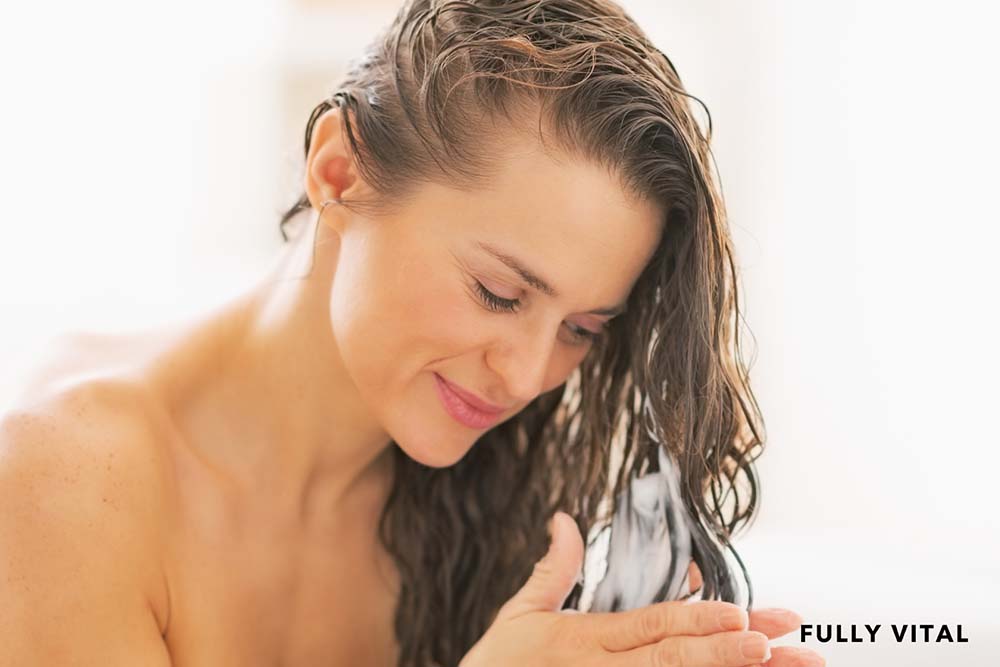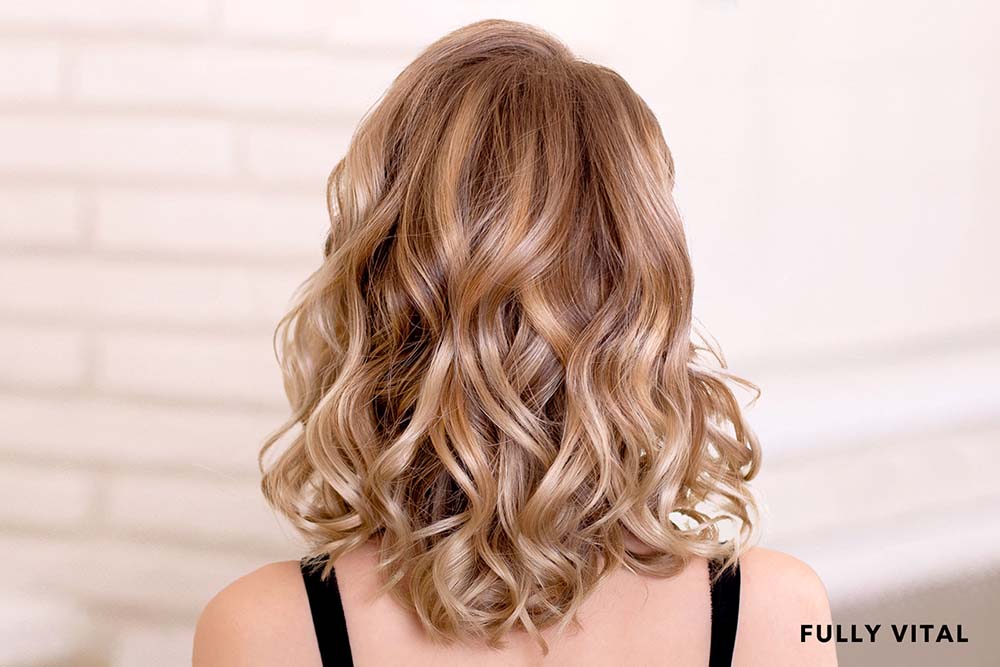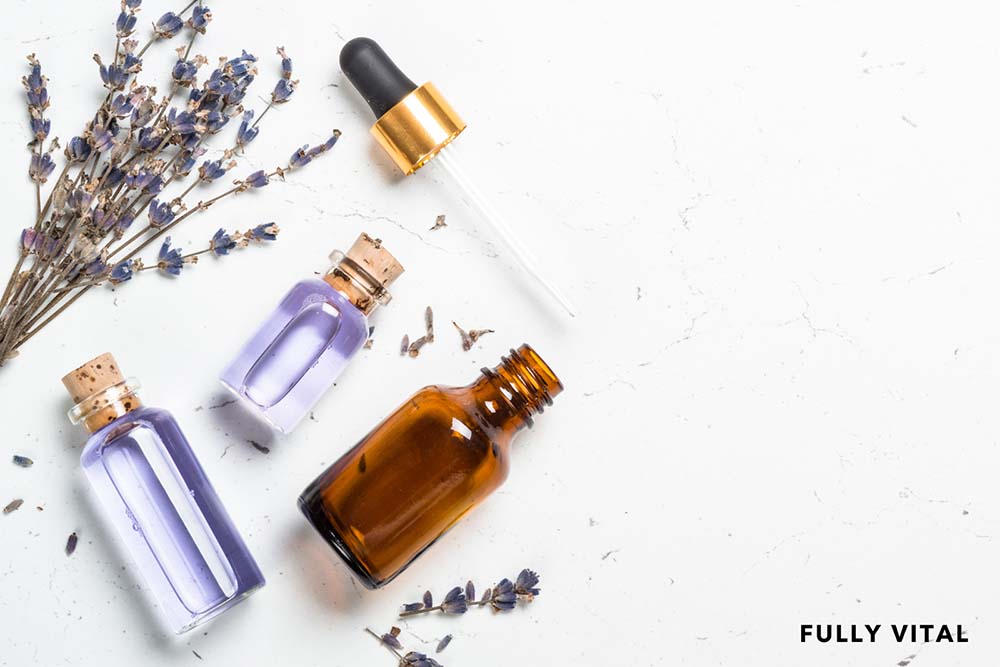
Conditioning: Unlocking the Secrets to Beautiful Hair Growth
Welcome, ladies, to our comprehensive guide on conditioning, the secret ingredient for achieving stunning hair growth!
Whether you have straight, wavy, curly, or coily hair, this article will unveil the wonders of conditioning and help you understand why it plays a vital role in your hair care routine.
So, let's dive in and explore everything you need to know about conditioning!

I LOVE MY HAIR NOW
FullyVital hair serum and hair vitamins made tremendous improvements in my hair. I truly love my hair now.
Meg S.,
What is Conditioning?
Conditioning is a crucial step in hair care that involves applying a nourishing product to your hair to restore moisture, improve manageability, and enhance overall hair health.(1)
It helps replenish the natural oils and proteins that might be lost due to environmental factors, heat styling, chemical treatments, or daily wear and tear.

What is the Importance of Conditioning?
Conditioning is important for several reasons.
Here's why you should make it an essential part of your hair care regimen:
Moisture Restoration
Conditioning products infuse moisture into your hair, preventing it from becoming dry, brittle, and prone to breakage.
Well-hydrated hair is more resilient and less prone to damage.
Improved Manageability
Conditioning smooths the hair cuticles, making your hair easier to detangle, comb, and style.
It reduces frizz and flyaways, leaving you with manageable locks that are a joy to style.
Enhanced Softness and Shine
Conditioning imparts a silky, soft texture to your hair, enhancing its natural shine and luster.
It creates a smooth surface that reflects light, making your hair look healthier and more vibrant.
Protection from Damage
Conditioning creates a protective barrier on your hair strands, shielding them from the damaging effects of heat styling tools, UV rays, and environmental pollutants.
It helps minimize the risk of split ends and hair breakage.
Promotes Hair Growth
By nourishing and strengthening your hair follicles, conditioning stimulates healthy hair growth.
It provides the ideal environment for your hair to thrive, promoting length retention and overall hair health.
How Does Conditioning Work?
Conditioning works by delivering essential nutrients, moisture, and proteins to your hair strands.
The conditioning product, such as a conditioner or deep conditioning treatment, is formulated with ingredients that penetrate the hair shaft, replenishing its moisture levels and repairing any damage.
When you apply a conditioner, it coats each strand, smoothing the hair cuticles and locking in moisture.(2)
The conditioner's active ingredients penetrate the hair, strengthening it from within and providing nourishment.
This process restores the hair's natural balance, leaving it soft, healthy, and ready to face the world.
What Are the Benefits of Conditioning?
The benefits of conditioning are numerous and remarkable.
Here are some key advantages you can expect from regular conditioning:
Hydrated and Nourished Hair
Conditioning moisturizes and nourishes your hair, preventing dryness, brittleness, and split ends.
Improved Elasticity
Conditioned hair has increased elasticity, reducing the risk of breakage and promoting length retention.(3)
Enhanced Hair Texture
Conditioning smooths the hair cuticles, making your hair feel silky, soft, and more manageable.
Reduced Frizz
Conditioning helps tame frizz and flyaways, resulting in smoother, more polished hairstyles.
Protection against Damage
Conditioning shields your hair from environmental stressors, heat styling tools, and chemical treatments.
Optimal Hair Growth Environment
Conditioning creates the ideal conditions for healthy hair growth, ensuring your hair reaches its full potential.
What Is The History of Conditioning?
Conditioning has a rich history in the world of hair care.
Here are some key points highlighting its evolution:
Ancient Practices
Conditioning has roots in ancient civilizations.
Egyptians used natural oils like castor oil and almond oil to moisturize and condition their hair.
Greeks and Romans applied mixtures of olive oil and perfumes to soften and enhance the appearance of their hair.
Early Commercial Conditioners
In the early 20th century, commercial hair conditioners started emerging.
These products typically contained ingredients like lanolin, mineral oil, and petroleum jelly to provide moisture and improve hair texture.
Advancements in Formulations
Over time, advancements in science and technology led to the development of more effective and innovative conditioner formulations.
Ingredients like silicones, proteins, and vitamins were incorporated to address specific hair concerns and provide targeted benefits.
Conditioning Treatments
In addition to regular conditioners, deep conditioning treatments gained popularity.
These treatments offer intense hydration, repair, and nourishment to combat damage and improve overall hair health.
What Is The Current Environment of Conditioning?
In today's beauty industry, conditioning plays a pivotal role in hair care routines. Here's a glimpse of the current conditioning landscape:
Wide Range of Choices
There is a vast array of conditioning products available, catering to different hair types, concerns, and preferences.
From traditional rinse-out conditioners to leave-in conditioners, masks, and oils, individuals have numerous options to suit their specific needs.
Focus on Natural Ingredients
Many consumers are now seeking natural and organic hair care options.
As a result, the market has seen an increase in natural and plant-based conditioners, free from sulfates, parabens, and other potentially harmful chemicals.
Customization and Personalization
Hair care brands are recognizing the importance of customization.
They are offering products that can be tailored to individual needs, addressing specific hair goals such as moisture, repair, volumizing, or color protection.
Inclusion of Technology
The integration of technology in hair care has also influenced conditioning. Innovative tools like heat-activated conditioners, conditioning devices, and apps that provide personalized recommendations are becoming more prevalent.
What Is The Future of Conditioning?
As the beauty industry continues to evolve, conditioning is expected to undergo further advancements.
Here are some potential trends and possibilities for the future:
Sustainable and Eco-Friendly Formulations
With growing environmental consciousness, the demand for sustainable and eco-friendly conditioning products is likely to rise.
Brands may focus on biodegradable packaging, responsibly sourced ingredients, and innovative manufacturing processes to minimize their environmental impact.
Advanced Delivery Systems
Future developments may include advanced delivery systems that enhance the efficacy of conditioning ingredients.
This could involve encapsulation technologies, time-release formulations, or innovative application methods.
Personalized Solutions
The trend of personalized hair care is expected to expand further.
Advanced technology, such as AI-powered diagnostics and DNA analysis, may enable the creation of truly customized conditioning products tailored to an individual's unique hair characteristics and needs.
Integrating Hair Growth Benefits
With your Hair Growth Product Company's focus on stimulating hair growth, future conditioners may incorporate specialized ingredients and formulations that not only condition but also promote healthy hair growth and scalp health.
Are There Any Downsides to Conditioning?
While conditioning offers numerous benefits, it's essential to be mindful of a few potential downsides:
Over-conditioning
Using too much conditioner or not rinsing it out properly may leave a residue on your hair, making it appear greasy or weighed down.
Use the recommended amount and ensure thorough rinsing.
Product Buildup
Frequent conditioning without regular clarification can lead to product buildup on your hair and scalp.
To prevent this, use a clarifying shampoo periodically to remove residue.
Choosing the Wrong Conditioner
Not all conditioners are created equal.
It's important to select a conditioner that suits your hair type and needs.
Consult with a hair care professional to find the perfect match for your hair.
Is Conditioning Good for Your Hair?
Absolutely! Conditioning is highly beneficial for your hair. Here's why:
Moisture and Nourishment
Conditioners replenish moisture, essential nutrients, and proteins, promoting healthy and hydrated hair.
Improved Manageability
Conditioning smooths the hair cuticles, making your hair easier to detangle, style, and manage.
Protection and Damage Prevention
Conditioning forms a protective barrier on your hair, safeguarding it from heat, environmental stressors, and damage.
Enhanced Appearance
Conditioning imparts softness, shine, and a healthier appearance to your hair, boosting its overall aesthetic appeal.
Stimulated Hair Growth
By providing a nourishing environment for your hair follicles, conditioning supports healthy hair growth.
Can I Use a Conditioner Without Shampoo?
Yes, you can use conditioner without shampoo, especially if you're following the co-washing (conditioner-only washing) method or if your hair doesn't require frequent shampooing.
Co-washing can be particularly beneficial for individuals with curly, dry, or damaged hair, as it helps retain moisture and reduces the risk of stripping natural oils.
However, it's important to note that using conditioner alone may not effectively remove product buildup or excess oils from the scalp, so occasional clarifying with a shampoo is still recommended.
How Often Should I Condition My Hair?
The frequency of conditioning depends on various factors such as your hair type, texture, and overall hair health.
Here are some general guidelines:
Normal Hair
Condition every time you shampoo, which is typically 2-3 times a week.
Dry or Damaged Hair
Condition more frequently, even on non-shampoo days, to provide extra moisture and repair.
Oily Hair
Focus on conditioning the mid-lengths and ends of your hair to avoid adding excess oil to your scalp.
Fine Hair
Use lightweight conditioners and consider conditioning every other wash to prevent weighing down your hair.
Curly or Coily Hair
Condition regularly, even on non-shampoo days, to maintain moisture and enhance curl definition.
What Are Some Natural Conditioners for Hair?
If you prefer natural options for conditioning your hair, here are some fantastic choices:
Coconut Oil
Apply warm coconut oil to your hair, leave it on for a few hours or overnight, and then rinse thoroughly.
It provides deep conditioning and nourishment.
Aloe Vera
Extract the gel from fresh aloe vera leaves and apply it to your hair.
Leave it on for 20-30 minutes before rinsing. Aloe vera conditions and soothes the scalp.
Apple Cider Vinegar
Mix one part apple cider vinegar with two parts water and use it as a final rinse after shampooing.
It helps restore the pH balance of your hair and adds shine.
Honey
Mix honey with water or aloe vera gel and apply it to your hair.
Leave it on for 30 minutes before rinsing.
Honey moisturizes and adds shine to your hair.
Avocado
Mash a ripe avocado and mix it with olive oil or coconut oil.
Apply the mixture to your hair, leave it on for 20-30 minutes, and then rinse.
Avocado provides deep conditioning and nourishment.
What Is the Best Leave-In Conditioner for My Hair Type?
Choosing the right leave-in conditioner depends on your hair type and specific needs. Here are some recommendations based on different hair types:
Fine or Thin Hair
Look for lightweight, volumizing leave-in conditioners that won't weigh down your hair. Opt for sprays or mists for easy application.
Curly or Coily Hair
Seek leave-in conditioners that offer moisture, definition, and frizz control.
Look for products that enhance curl pattern and provide long-lasting hydration.
Dry or Damaged Hair
Choose leave-in conditioners that focus on deep hydration, repair, and strengthening.
Look for products with nourishing ingredients such as oils, butters, and protein.
Color-Treated Hair
Select leave-in conditioners specifically formulated for color-treated hair.
These products help maintain color vibrancy, while also providing conditioning benefits.
Heat-Styling or Chemically Treated Hair
Opt for leave-in conditioners that offer heat protection and help combat the effects of chemical treatments.
Look for products with added moisture and repair properties.
What Are the Alternatives to Conditioning?
While conditioning is the most common and effective method for maintaining healthy hair, there are a few alternatives you can explore:
Hair Masks
Hair masks are intensive treatments that offer deeper conditioning benefits.
They are usually applied once a week or as needed, providing an extra boost of moisture and repair.
Natural Oils
Some natural oils, such as coconut oil, argan oil, or jojoba oil, can be used as alternatives to conditioners.
These oils penetrate the hair shaft, nourishing and moisturizing your hair naturally.
Discover the Power of Fully Vital Hair Growth Products!Key Features and Benefits:
Take the First Step Today! Discover the power of Fully Vital hair growth products and experience the transformation firsthand. Embrace the opportunity to revitalize your locks and enjoy a more vibrant and healthy relationship with your hair. Remember, your hair deserves the best care. Choose Fully Vital for scientifically advanced hair growth solutions that can make a real difference. |
Final Thoughts
Conditioning plays a crucial role in achieving and maintaining healthy, vibrant hair.
Through its moisturizing, nourishing, and protective properties, conditioning helps to improve hair texture, manageability, and overall appearance. Whether you have dry, damaged, or normal hair, incorporating regular conditioning into your hair care routine can make a significant difference.
At Fully Vital, we understand the importance of healthy hair and the desire to stimulate hair growth.
We offer a variety of hair growth products designed to combat the aging process and promote a healthier relationship with your locks.
Our products are formulated to provide the essential nutrients and support your hair needs to thrive.
So, take the first step towards revitalizing your hair and achieving your hair growth goals.
Explore our range of hair growth products and discover how Fully Vital can help you in your journey to healthier, more luscious locks.
Your hair deserves the best care, and we're here to support you every step of the way.
Frequently Asked Questions about Conditioning (FAQ)
How often should I condition my hair?
It is generally recommended to condition your hair every time you shampoo, which is usually 2-3 times a week. Adjust the frequency based on your hair type and needs.
Can I use a conditioner on my scalp?
Conditioner should primarily be applied to the mid-lengths and ends of your hair.
Avoid applying it directly to your scalp, as it may weigh down your hair or cause oiliness.
Is it necessary to deep condition my hair?
Deep conditioning is not mandatory for everyone, but it can be beneficial, especially for damaged or excessively dry hair.
Deep condition once a week or as recommended by your hair care professional.
Can I leave a regular conditioner on my hair for an extended period?
Regular conditioners should be rinsed out after the recommended time mentioned on the product.
Leaving them on for an extended period may lead to product buildup or greasiness.
Should I use different conditioners for different seasons?
You may need to adjust your conditioner based on the changing seasons and the specific needs of your hair during different weather conditions.
Opt for lighter conditioners in humid climates and richer ones in drier climates.
Can I condition my hair if I have oily hair?
Yes, even if you have oily hair, you can still benefit from conditioning.
Look for lightweight, oil-free conditioners or focus on applying conditioner to the ends of your hair, avoiding the scalp.
Can I use conditioner on color-treated hair?
Absolutely! Conditioning is essential for color-treated hair as it helps maintain moisture balance and keeps the hair looking vibrant and healthy.
Look for conditioners specifically formulated for color-treated hair.
Is conditioning better than shampooing?
Conditioning and shampooing serve different purposes in your hair care routine.
Shampooing helps cleanse your hair and scalp by removing dirt, oil, and product buildup, while conditioning replenishes moisture and nourishment.
Both steps are essential for maintaining healthy hair.
Conditioning should not replace shampooing, as shampooing is necessary to ensure a clean and balanced scalp.
It's best to include both conditioning and shampooing in your regular hair care routine.
Should I wash my hair after applying conditioner?
Yes, it's important to rinse out the conditioner after application.
Leaving conditioner in your hair can lead to product buildup, making your hair appear greasy and weighed down.
After applying conditioner, thoroughly rinse it out with water until your hair feels clean and the conditioner is completely removed.
Do you put conditioner or shampoo first?
The general rule is to shampoo first and then follow with conditioner.
Shampooing cleanses your hair and scalp, removing dirt and excess oils.
Once you've rinsed out the shampoo, apply conditioner to your hair, focusing on the mid-lengths and ends.
Conditioning helps restore moisture and nourish your hair, leaving it soft and manageable.
Can I mix shampoo and conditioner?
While it's not recommended to mix shampoo and conditioner together before application, there are some products on the market that combine the benefits of both shampoo and conditioner in one formula. These are often referred to as "2-in-1" or "shampoo-conditioner" products.
However, keep in mind that these products may not provide the same level of cleansing and conditioning as separate shampoo and conditioner used individually.
What happens if you don't use conditioner?
If you skip using conditioner regularly, your hair may become dry, brittle, and prone to breakage.
Conditioner helps restore moisture, smooth the hair cuticles, and provide essential nutrients.
Without conditioning, your hair may lack shine, become more difficult to manage, and be more susceptible to damage from heat styling, environmental factors, and everyday wear and tear. Incorporating conditioner into your hair care routine is crucial for maintaining healthy, vibrant hair.
Sources:
- Rathi, S. K., & D′Souza, P. (2015). Shampoo and conditioners: What a dermatologist should know? Indian Journal of Dermatology, 60(3), 248. https://doi.org/10.4103/0019-5154.156355
- Trueb, R., Henry, J., Davis, M., & Schwartz, J. (2018). Scalp condition impacts hair growth and retention via oxidative stress. International Journal of Trichology, 10(6), 262. https://doi.org/10.4103/ijt.ijt_57_18
- How to Use Leave-In Conditioner, Benefits, and Precautions. (2020, September 22). Healthline. https://www.healthline.com/health/how-to-use-leave-in-conditioner







